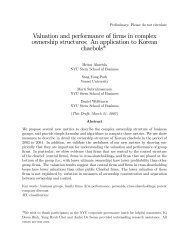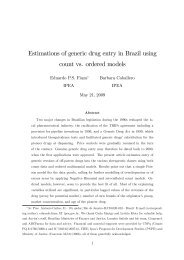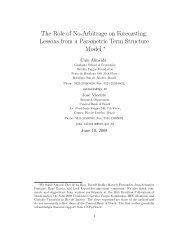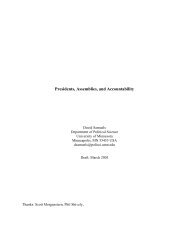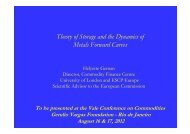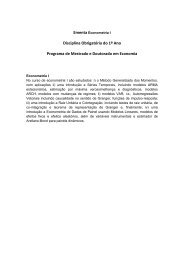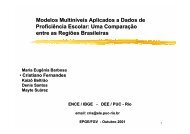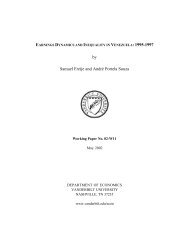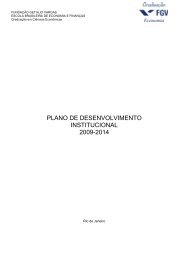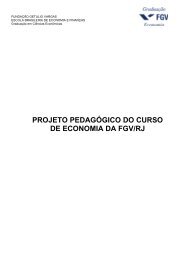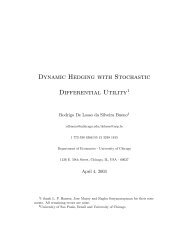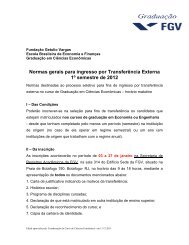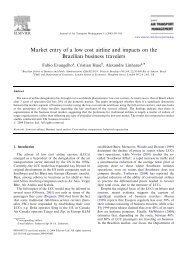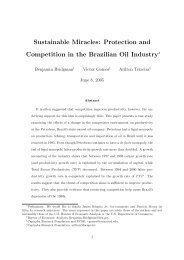Does Money in Schools Matter? Evaluating the Effects ... - EPGE/FGV
Does Money in Schools Matter? Evaluating the Effects ... - EPGE/FGV
Does Money in Schools Matter? Evaluating the Effects ... - EPGE/FGV
You also want an ePaper? Increase the reach of your titles
YUMPU automatically turns print PDFs into web optimized ePapers that Google loves.
Table 5 below presents <strong>the</strong> results of regression that looks at <strong>the</strong> determ<strong>in</strong>ants of<br />
teachers’ wages for <strong>the</strong> pooled 1997 and 1999 sample. The first column shows that real<br />
wages <strong>in</strong>creased <strong>in</strong> 1999, that was <strong>in</strong> public schools are lower on average <strong>the</strong>n <strong>in</strong> <strong>the</strong> private<br />
ones and that wages <strong>in</strong> science teachers are lower than those of <strong>the</strong> Ma<strong>the</strong>matics teachers.<br />
The second column however shows that <strong>the</strong>re was an <strong>in</strong>crease of about 32% <strong>in</strong> <strong>the</strong> average<br />
wages of public school teachers <strong>in</strong> 1999, as compared to <strong>the</strong>ir private schools counterparts.<br />
Column 3 <strong>the</strong>n <strong>in</strong>cludes <strong>the</strong> teachers’ characteristics and we can see that FUNDEF<br />
coefficient decl<strong>in</strong>es a little, but rema<strong>in</strong>s statistically significant. In column (4) we control<br />
for <strong>the</strong> school characteristics, <strong>in</strong>clud<strong>in</strong>g <strong>the</strong> director’s wage and <strong>the</strong> coefficient rema<strong>in</strong>s<br />
statistically significant, mean<strong>in</strong>g that Fundef raised <strong>the</strong> public school teachers’ wages by<br />
about 20%. Interest<strong>in</strong>gly enough <strong>the</strong>re is a positive correlation between <strong>the</strong> director’s and<br />
<strong>the</strong> teachers’ wages, which may reflect ‘match<strong>in</strong>g’ or school unobserved characteristics.<br />
In Table 6 we present <strong>the</strong> results of <strong>the</strong> second–state regression, about <strong>the</strong><br />
determ<strong>in</strong>ants of <strong>the</strong> students’ performance <strong>in</strong> test scores. In <strong>the</strong> first column, one can note<br />
that <strong>the</strong>re was a decl<strong>in</strong>e <strong>in</strong> students’ proficiency <strong>in</strong> 1999 and that students fare worse <strong>in</strong><br />
Portuguese and Sciences than <strong>in</strong> Ma<strong>the</strong>matics (<strong>the</strong> omitted category). Moreover, boys tend<br />
to perform better than girls, young pupils than older one, and white <strong>the</strong>n non-whites.<br />
Family background, as measured by mo<strong>the</strong>r’s school<strong>in</strong>g does has a strong impact on test<br />
scores. Moreover, pupils that failed <strong>in</strong> <strong>the</strong> past (a measure of unobserved ability) tend to do<br />
worse. The results as a whole are <strong>in</strong> l<strong>in</strong>e with o<strong>the</strong>r studies <strong>in</strong> <strong>the</strong> school proficiency<br />
literature.<br />
In column (2) we <strong>in</strong>clude <strong>the</strong> public school <strong>in</strong>dicator and <strong>the</strong> FUNDEF dummy, that<br />
is, <strong>the</strong> <strong>in</strong>teraction between public school and 1999. It seems that public school students tend



